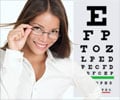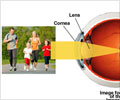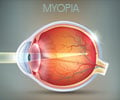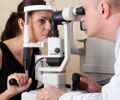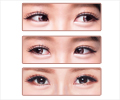Special contact lenses are being evaluated by the manufacturer for their possible use in the slowing down of progression of myopia or short-sightedness.
- Myopia or short-sightedness is extremely common today
- Myopia is usually treated with spectacles, lenses and laser surgery
- Special contact lenses have been suggested as a possible treatment to reduce myopia progression
Myopia commonly affects children, and a delay in diagnosis could affect the child’s performance in school. The exact cause of myopia in children is not known. It could be hereditary or possibly due to environmental factors. It has been suggested that being outdoors and getting exposed to sunlight and viewing longer distances can reduce the chances of myopia. This could explain the growing incidence of myopia especially in the East Asian countries, where stress is laid on academic performance. This, however, has to be validated.
Short-sightedness progresses as the child grows up. Severe myopia is associated with eye diseases like glaucoma, cataract or retinal detachment. Quite often, the children do not complain about their inability to see clearly since the condition is present from birth, and they do not know what clear vision is. Regular eye check-ups in schools and health care centers could help to identify several cases at an early stage.
In a clinical trial, the ability of a special type of contact lenses to reduce myopia progression in children was tested by the manufactures of the lenses. A hundred and forty four children with myopia aged between 8 and 12 years from four countries - Singapore, Canada, England, and Portugal – were included in the study. The lens power in these children varied from 0.75D to 4.00D. The children were divided into two groups – one group used a dual-focus daily disposable myopia control soft contact lens, while the second group used single vision contact lens for comparison. The study was carried out for a period of three years.
According to the researchers:
- The dual-focus lenses slowed the progression of short-sightedness by 59% when measured by a parameter called mean cycloplegic spherical equivalent (SE)
- The lenses were well accepted by the children, and had a higher satisfaction as compared to spectacles
- The lenses did not affect their daily activities which include school work, reading, playing outside, and computer use
- Most children could use their lenses independently
- The ease among the parents about the children wearing the contact lenses increased from less than 50% at the beginning of the study to 79% after one month after beginning the treatment
- Nine out of ten parents rated their children as extremely happy with the overall experience of wearing contact lenses
Further studies in larger number of children will be required to confirm the findings of this study, before the lenses can be accepted for general use. The cost of the treatment will also have to be considered, especially in the Asian countries that are seeing a myopia boom.
- Paul Chamberlain. 3-year
effectiveness of a Dual-Focus 1 Day Soft Contact Lens
for Myopia Control. Presented at the 40th BLCA Clinical Conference, Liverpool, June 9-11, 2017
Source-Medindia


